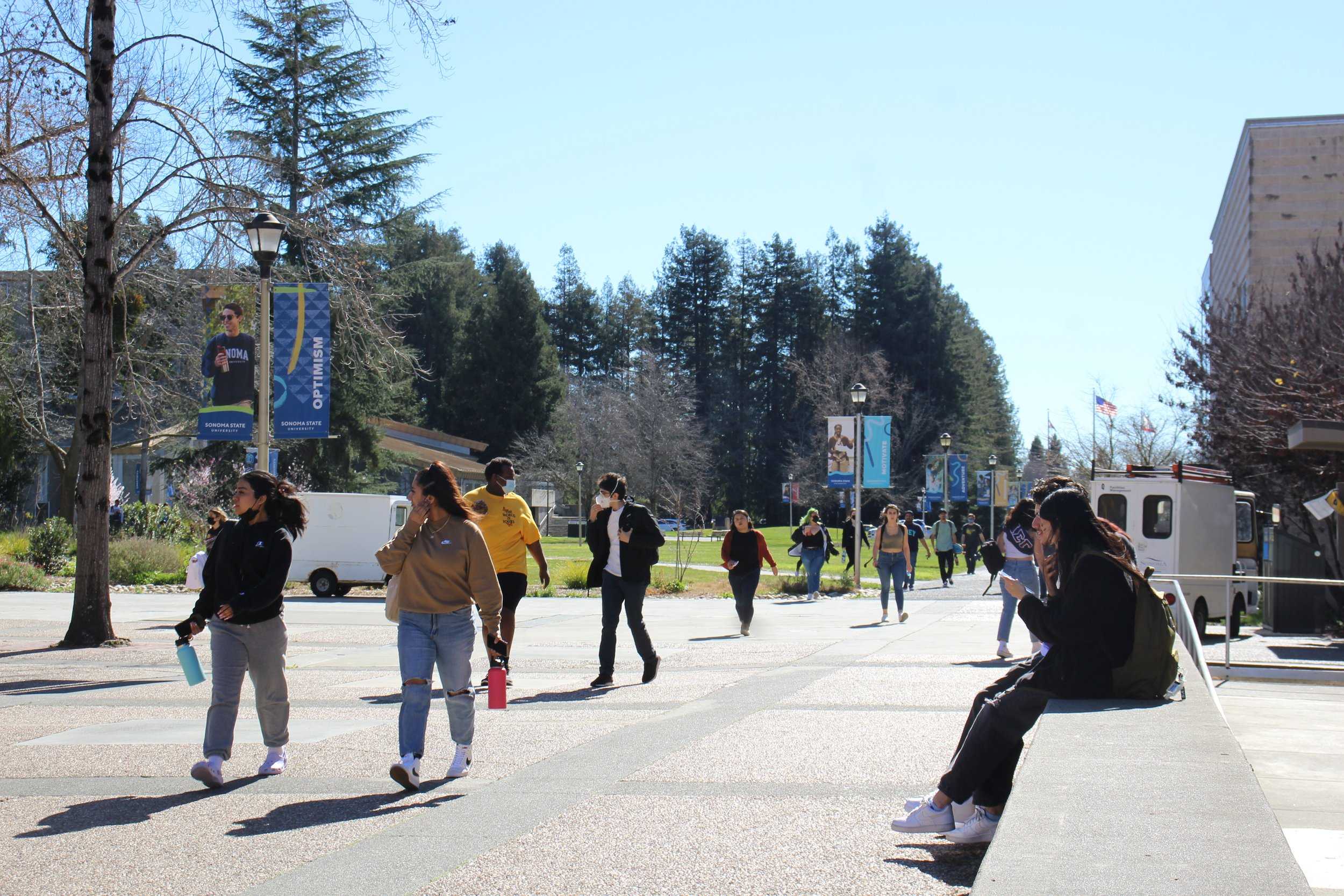Sonoma State University reopened their campus on Feb. 14 for in-person learning after shifting the majority of their services online at the start of the COVID-19 pandemic.
SSU is using a variety of strategies to reduce the spread of COVID-19.
Students are being protected through the use of COVID-19 safety protocols such as the use of hand sanitizer, daily wellness screenings, and required weekly testing for unvaccinated students.
All SSU students eligible for the COVID-19 vaccine booster are required to have proof of their booster submitted to the Student Health Portal by Monday, Feb. 28. If students eligible for a booster fail to get it, they are no longer considered fully vaccinated and will be required to have a negative COVID-19 PCR test on file with SSU at least every 7 days.
Students not yet eligible to get a booster will not be required to comply with the weekly testing protocol until the date they become eligible for a booster.
All students are expected to fill out a daily wellness screening prior to every arrival to campus. Students living on campus are expected to complete the wellness screening prior to leaving their rooms every day.
These wellness screenings are intended to reduce the amount of on-campus COVID-19 transmission. On Monday, Feb. 14, when the majority of students returned to campus for the first time, the COVID Monitoring Team and Student Health Center became aware of a problem that was preventing students from completing the daily wellness screening on IOS devices. Students experiencing this problem were informed to update their Apple device(s) software to the latest IOS version.
Sonoma State is also working to reduce on-campus COVID-19 transmission by continuing to require that face masks be worn inside all campus buildings despite the statewide mandate being lifted.
SSU’s Assistant Vice President for Strategic Communications, Julia Gonzalez, stated in an email, “Although California has lifted the mask mandate, public health officials highly recommend the continued use of face masks when indoors, therefore at this time the campus will continue to follow all COVID safety protocols including the wearing of face masks indoors. We will continue to monitor health conditions and change the mask practices when it seems prudent.”
Emma Molloy, a 24-year-old Communications and Media Studies major has noticed that despite students being expected to complete the daily wellness screenings, no one is actually enforcing the policy. One of her classrooms is small, preventing social distancing from being possible and as an immunocompromised student that does make her nervous. However, for Molloy, the benefits from being on campus outweigh the anxiety.
“At first I was nervous to be on campus again, but after three days I can already tell my mental health has gotten a lot better…Obviously I don’t want to get sick, and it is scary because I am immunocompromised, but I have my booster. There’s not much more I can do,” Molloy said.
For immunocompromised students, or students nervous to attend class in person, SSU currently has more online classes than ever before.
“We will continue to offer a greater number of online courses than we did prior to the pandemic. We hope that this will allow students some flexibility. Faculty also have the liberty to pivot to remote instruction, should the risk for COVID increase or a class become exposed,” Gonzalez said.
Gonzalez also explained that any immunocompromised students should contact Disabled Student Services and their advisor to ask about accommodations that would best allow them to continue their academic progress at SSU.
In line with students returning back to campus, the library recently increased their hours to accommodate more students.
The Dean of the Library, Karen Schneider, wrote in an email, “We are excited to have reopened this spring at 75 hours per week, which is slightly less than we offered pre-COVID, and we are monitoring the return to campus to determine hours for future semesters. We are also delighted to announce that if local COVID conditions continue to improve, we plan to offer extended hours just prior to and during final exams this semester.”
More students being on campus at once has also increased the demand for on-campus food and beverage options.
David Rodriguez-Mellin, a 21-year-old Sociology major said, “I feel Sonoma State should have at least four food options, I’m assuming COVID is a factor, or just not enough workers, but it would be awesome if they had more.”
Associate Vice President for Administration of Finance, Neil Markley, explained in an email that the school’s Culinary Services will likely keep the majority of their on-campus food and beverage locations closed until the fall, however, Lobo’s Café will be reopening Feb. 28 at the latest.
Markley explained the continued closure of on-campus restaurants is due to being short-staffed.
“As the largest employer of students on-campus, we are proud to continue to provide opportunities. Given the COVID delay in our return to campus, our full pool of students was not here to hire. With the students’ return to campus, we are hiring as quickly as we can,” Markley wrote. “Like many organizations rebounding from COVID, it does take some time to return to “normal” operations.”
This semester is going to be an adjustment period for everyone.
Eamonn Cullen, a 23-year-old Communications and Media Studies major said, “I was a little nervous for in-person classes because I haven’t been in a classroom in almost 2 years, but it was very refreshing to meet new people I’ve been seeing on zoom for the last few weeks, and that nervous feeling went away pretty quickly.”
STAR//Mikayla Fritzemeier
SSU students walk past Darwin Hall on their way to class. For many students, this is their first time on campus.



































